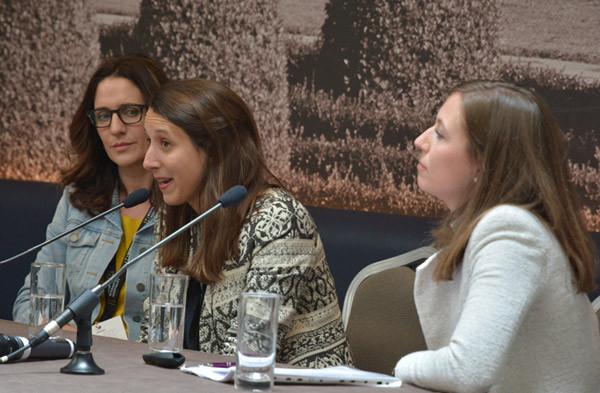✕

Column: industry Tag: hotel,hotel guest demand,segment blur Published: 2017-06-01 14:47 Source: Author:
Guest demand is blurring the lines between alternative-accommodations providers and hotel companies, according to executives from Onefinestay, Meininger Hotels and Clink Hostels that shared the stage at a recent boutique conference.

(From left) Anne Dolan of Clink Hostels, Clara Audry of Onefinestay, and Eva Bachmann of Meininger Hotels participate on a “Reinventing accommodation” panel at the Boutique Lifestyle Hotel Summit in London. (Photo: Terence Baker)
LONDON—As guest demand evolves across Europe, hotel companies, hostel brands and serviced-homes providers have learned they often are attracting the same demographics.
Executives from Germany-based Meininger Hotels, Irish company Clink Hostels and AccorHotels’ Onefinestay agreed they are seeing segment blur in what guests book across business, leisure and family trips, and that affects how these companies plan to grow their product throughout Europe.
“Our magic (age) number for our guests is 24, but as hostels improve the client base changes, and we’re seeing families, young creatives, now that people realize ‘I’m not running a charity,’” said Anne Dolan, co-founder of Clink Hostels on the “Reinventing accommodation” panel at the Boutique Lifestyle Hotel Summit. “The quality of some hostels challenges 3-star hotels.”
Clara Audry, VP of growth and expansion at Onefinestay—which was acquired by AccorHotels in April 2016 for €148 million?($165.4 million)—said the company’s guest mix consists of a lot of family bookings, but she added she has seen a rise in business travelers and young couples booking stays at Onefinestay properties.
Eva Bachmann, director of acquisitions and strategy at Meininger Hotels, said the company started with German school groups but also has observed an increase in families, although the demographic of those families differed from those booking through Onefinestay.
Meininger’s hotels offer traditional hotel-style guestrooms as well as hostel-style shared rooms.
“Success has come from when we opened in 1999,” Bachmann said. “We were ahead of the curve, when no one was talking about hostels, and low operational costs have led to better margins.”
Dolan agreed that return on investment is the key driver, which is aided by getting the right staff and locations.
The panelists also discussed what they consider the best traits and working strategies of the boutique and lifestyle hotel segment.
“We’re closer to a boutique hotel than to a peer-to-peer platform,” Audry said. “We’re serving guests who are open-minded as to what the hotel of the future will be.”
Bolstering blur
Panelists stressed the human element of their companies, which allows them to widen their guest appeal and better compete with higher segments.
“Authenticity is at the heart, allowing staff to be the best they can. There is no guide for new joiners,” Audry said, who added integrity and care are also key to the experiences Onefinestay wants to provide.
Dolan said Clink Hostels?has a development goal to put new properties at the heart of their cities’ creative communities. The company’s third property, for example, is located in Amsterdam’s Noord district, which is a short ferry trip from the city’s central station.
Bachmann described Meininger as being dynamic, playful and flexible.
“If you do what you do well, there’ll be space in the market,” Bachmann said, who added Meininger is now looking at developing in the U.S.
Segment outlook
Dolan and Bachmann said they are optimistic guest demand for their companies’ product will remain steady.
“Ryanair plans on doubling its numbers by 2020,” Dolan said, who added that the increases in the numbers of travelers has reduced length of stays as more travelers seek weekend or short getaways.
Bachmann added that these demand drivers will see the budget and hostel segment further expand in line with the increased trust of owners.
Trust and relationships are focuses for Onefinestay, too, Audry said, who added travelers are increasingly traveling across hotel segments and taking more trips per year.
Dolan said one thing she is concerned with is that the large hotel companies also are getting into her space, notably AccorHotels with its Jo&Joe concept.
Bachmann suggested the best defense is to not deviate from what makes your brand unique.
“Market segmentation will undoubtedly change over the next five years,” she said. “You cannot be something to everyone, so concentrate on your core.”
Previous:Viceroy Chicago Hotel to Open This September
Next:Hotels Now See Online Travel Sites As Rivals - MarketWatch
Hot key words
Hot Products
Popular Vendors